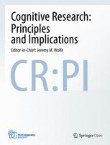Can corrections spread misinformation to new audiences? Testing for the elusive familiarity backfire effect

my notes ( ? )
"The practical implications of this research are clear: recommendations to front-line educators and communicators to entirely avoid repeating misinformation when debunking (Cook & Lewandowsky, 2011; Lewandowsky et al., 2012; Peter & Koch, 2016; Schwarz et al., 2007, 2016) were unwarranted.
[...]
That being said, recommendations to avoid unnecessary misinformation repetition should arguably remain in place—while one repetition in the context of a correction may have benefits for correction salience, additional repetition of the misinformation runs the risk of enhancing familiarity without any added benefit. "
Read the Full Post
The above notes were curated from the full post link.springer.com/article/10.1186/s41235-020-00241-6.Related reading
More Stuff I Like
More Stuff tagged cognitive psychology , psychology and ux , cognitive bias , misinformation